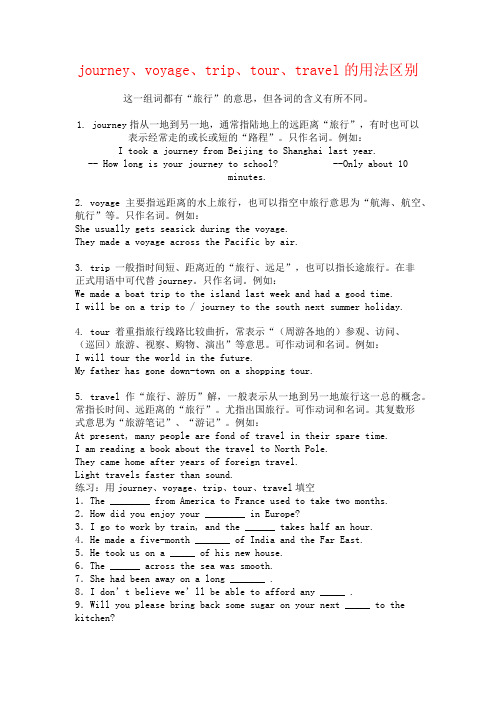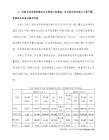travel__trip__journey的用法辨析
- 格式:doc
- 大小:29.00 KB
- 文档页数:2

英语中,表达“旅行、旅程”的常用词有travel, tour, journey和trip。
今天与大家共同学习一下这几个词的用法区别。
1. travel: 泛指旅行的行为,而不特指某次具体的旅行。
一般指长途旅行,不强调旅行的目的地。
例句1:My father has traveled the whole country.我父亲已经游遍了全国。
例句2:He was a very wealthy man who had traveled the world.他是个非常富有的人,曾经周游过世界。
2. tour: 指最后要返回出发地的旅行,旅途中有停留游览点,目的各异的巡游。
这种旅行距离可长可短。
例句3:The writer will tour the country promoting his book.这个作家将在全国巡回推销他的书。
例句4:You can tour the site on bicycle.你可以骑自行车游览那处遗址。
3. trip: 是一个较口语化的词,常指短途旅行。
例句5:They are planning a trip to Shanghai.他们正计划去上海旅游。
例句6:We went on a trip to the mountains.我们到山里去旅游了。
4. journey: 最常用词,常指长距离旅行,且是单程陆路旅行。
但有时也指水上或空中旅行。
例句7:It was a long journey, but we eventually arrived.虽然旅程很长,但是我们最后还是到达了。
例句8:How long does the journey usually take?这段旅程通常需要多长时间?。

1. trip指具体一次的短期外出.在口语中,trip 可与journey互换。
I am going on a trip to the seaside during the summer holidays.暑假期间我将去海边旅行。
He went on a trip/ journey to Paris.他到巴黎旅行去了。
He made a trip to the Great Wall yesterday. 2. journey指陆地上的远程旅行,表示“去旅行”时,英语该说go on a journey.Mr. Smith made a journey from Paris to New York.史密斯先生作了一次从巴黎到纽约的旅行。
Wish you have a good journey.另外journey还能够强调抽象的“旅程”。
Life is a journey.3.travel旅行的总称,泛指旅行各地,长途旅行。
(与journey不同之处,在于不着重某一目的地,有到各地“游历”的意思。
作名词时常用复数形式,指游记。
)The travels of Marco Polo is one of the most interesting books that I have ever read.4. tour 周游,指游览,视察,购物为目的,途中在许多地方作短暂停留的观光游览。
(一般团队游都是tour,带有导游的是Guide Tour。
)法国5日游:5-day Tour to FranceHe is making a tour of the world.他周游世界去了。
They spent two months on a tour through most of the countries of Europe.他们用了两个月的时间去旅行,游历了欧洲的大部分国家。
5. voyage: 尤指海上之旅Many are finding that the most pleasant way to travel is a voyage on a ship.。

journey、voyage、trip、tour、travel的用法区别这一组词都有“旅行”的意思,但各词的含义有所不同。
1. journey指从一地到另一地,通常指陆地上的远距离“旅行”,有时也可以表示经常走的或长或短的“路程”。
只作名词。
例如:I took a journey from Beijing to Shanghai last year.-- How long is your journey to school? --Only about 10minutes.2. voyage主要指远距离的水上旅行,也可以指空中旅行意思为“航海、航空、航行”等。
只作名词。
例如:She usually gets seasick during the voyage.They made a voyage across the Pacific by air.3. trip 一般指时间短、距离近的“旅行、远足”,也可以指长途旅行。
在非正式用语中可代替journey。
只作名词。
例如:We made a boat trip to the island last week and had a good time.I will be on a trip to / journey to the south next summer holiday.4. tour 着重指旅行线路比较曲折,常表示“(周游各地的)参观、访问、(巡回)旅游、视察、购物、演出”等意思。
可作动词和名词。
例如:I will tour the world in the future.My father has gone down-town on a shopping tour.5. travel作“旅行、游历”解,一般表示从一地到另一地旅行这一总的概念。
常指长时间、远距离的“旅行”。
尤指出国旅行。
可作动词和名词。
其复数形式意思为“旅游笔记”、“游记”。


journey和trip和travel用法1. "Journey" 通常指的是较长时间、距离的旅行,就像一次伟大的征程!比如:My journey across Europe was an adventure of a lifetime.(我的欧洲之旅简直是一生一次的大冒险!)2. You know what? "Trip" is more like a shorter and specific journey. Say, I took a trip to the beach last weekend.(你知道吗?“trip”更像是一次较短且特定的行程。
比如说,我上周末去海滩玩了一趟。
)3. Have you noticed? "Travel" is kind of a broad term. It can mean moving around in general. Example: I love to travel and see new places.(你注意到了没有?“travel”是个挺宽泛的词。
它大致就是指到处走动。
比如:我喜欢到处旅行,看新地方。
)4. Isn't it amazing how we use these words? When we say "a journey of self-discovery", it sounds so profound. Just like that!(我们使用这些词的方式是不是很神奇?当我们说“一次自我发现的旅程”,听起来好深刻呀。
就是这样!)5. Now, think about it. We might say "I'm going on a trip to the mountains". That's so different from saying "My travel experiences have been amazing".(现在,想想看。

英语中不是哪个单词拥有哪个汉意就可以随便添加,他们都有各自的区别。
那么我们来看看各位同学们是进行了哪个旅行呢,是journey, travel还是trip呢旅游可以说是广受大家喜爱,在英语中用于表达旅游的单词很多,journey、travel、trip等,究竟这些词适合哪些旅游场合呢?1.Journey 可作名词动词,n.旅行、行程;Vi.旅行。
这里的旅行指的是距离较远的旅行,远途旅行,且不强调回到出发点。
Its a long journey from here to New York.从这里去纽约是一段很长的旅程。
I want to take an air journey.我想乘飞机去旅行。
2.Travel 可作名词和动词,n.旅行;Vi.旅行,行进。
Travel所指的旅行是长距离的旅行,如:国外旅行。
She came back after weeks of foreign travel.经过几周的国外旅行,她回来了。
He has travelled through the country.他已经旅行遍了全国。
3.Trip 同样可作名词和动词,所指的旅行指的是短距离旅行,花费时间较短。
日常用语中可与journey相互替换。
Let me join your mountaineering trip.让我加入你的登山旅行计划。
4. tour 着重指旅行线路比较曲折,常表示“(周游各地的)参观、访问、(巡回)旅游、视察、购物、演出”等意思。
可作动词和名词。
I will tour the world in the future. My father has gone down-town on a shopping tour.人生就像一场旅行,我们要学会欣赏沿途的风景!(资料素材和资料部分来自网络,供参考。
可复制、编制,期待你的好评与关注)。
journey、voyage、trip、tour、travel的用法区别这一组词都有“旅行”的意思,但各词的含义有所不同。
1. journey指从一地到另一地,通常指陆地上的远距离“旅行”,有时也可以表示经常走的或长或短的“路程”。
只作名词。
例如:I took a journey from Beijing to Shanghai last year.-- How long is your journey to school? --Only about 10 minutes.2. voyage主要指远距离的水上旅行,也可以指空中旅行意思为“航海、航空、航行”等。
只作名词。
例如:She usually gets seasick during the voyage.They made a voyage across the Pacific by air.3. trip 一般指时间短、距离近的“旅行、远足”,也可以指长途旅行。
在非正式用语中可代替journey。
只作名词。
例如:We made a boat trip to the island last week and had a good time.I will be on a trip to / journey to the south next summer holiday.4. tour 着重指旅行线路比较曲折,常表示“(周游各地的)参观、访问、(巡回)旅游、视察、购物、演出”等意思。
可作动词和名词。
例如:I will tour the world in the future.My father has gone down-town on a shopping tour.5. travel作“旅行、游历”解,一般表示从一地到另一地旅行这一总的概念。
常指长时间、远距离的“旅行”。
尤指出国旅行。
可作动词和名词。
其复数形式意思为“旅游笔记”、“游记”。
journey、voyage、trip、tour、travel的用法区别这一组词都有“旅行”的意思,但各词的含义有所不同。
1. journey指从一地到另一地,通常指陆地上的远距离“旅行”,有时也可以表示经常走的或长或短的“路程”。
只作名词。
例如:I took a journey from Beijing to Shanghai last year.-- How long is your journey to school? --Only about 10 minutes.2. voyage主要指远距离的水上旅行,也可以指空中旅行意思为“航海、航空、航行”等。
只作名词。
例如:She usually gets seasick during the voyage.They made a voyage across the Pacific by air.3. trip 一般指时间短、距离近的“旅行、远足”,也可以指长途旅行。
在非正式用语中可代替journey。
只作名词。
例如:We made a boat trip to the island last week and had a good time.I will be on a trip to / journey to the south next summer holiday.4. tour 着重指旅行线路比较曲折,常表示“(周游各地的)参观、访问、(巡回)旅游、视察、购物、演出”等意思。
可作动词和名词。
例如:I will tour the world in the future.My father has gone down-town on a shopping tour.5. travel作“旅行、游历”解,一般表示从一地到另一地旅行这一总的概念。
常指长时间、远距离的“旅行”。
尤指出国旅行。
可作动词和名词。
其复数形式意思为“旅游笔记”、“游记”。
表示“旅行”意义的词用法辨异在英语中,journey,travel,trip,tour,voyage,excursion,expedition,pilgrimage都表示从一处到另一处的“旅行”,但是,它们在含义和用法上存在着一些差别。
现分述如下:一、journey适用范围很广,可指陆路、海路或飞行的长途旅行,不表示返回原出发点。
例如:1)If you are going on a journey,see that you take with you all that you may need.如果你要去旅行,注意要把你可能需要用的全部东西带上。
2)It is about 20 hours’journey by train from Beijing to Shanghai. 从北京到上海坐火车大约需要20小时。
二、travel多指长途、国外、大型、正规之旅行,包括不同地点的多次旅行。
例如:1)He has just returned from his travel. 他刚刚旅行归来。
2)They made a number of Japanese friends during their travel. 他们在旅行时结识了许多日本朋友。
三、trip一般用来指短距离旅行或远足,其目的可以是公事或娱乐。
例如:1)The nature of my work requires me to make daily trips to the city. 我的工作性质要求我每天进城。
2)We took a trip to the Summer Palace. 我们到颐和园玩了一次。
trip也可指长途旅行。
这时trip与journey的区别仅在于trip是个通俗的用词,而journey是个正式的用词。
例如:3)He will make a round-the-world trip. 他将周游世界。
四、tour指周游,常带有“最后回到原出发点”的含义。
travel, trip, journey,tour
,voyage
的用法辨析
1. travel 泛指一般意义的旅行,是不可数名词。
travel作“旅行、游历”解,一般表示从一地到另一地旅行这一总的概念。
常指长时间、远距离的“旅行”。
尤指出国旅行。
可作动词和名词。
At present, many people are fond of travel in their spare time.
I am reading a book about the travel to North Pole.
They came home after years of foreign travel.
Light travels faster than sound.
He is fond of travel (= travelling). 他喜欢旅行。
Travel is much cheaper than it used to be. 现在旅行比过去便宜多了。
注:有时可用复数形式,主要指时间较长的各处旅行,此时通常有物主代词修饰,但是尽管用了复数形式,却不能与many 或数词连用。
如:
He’s gone off on his travels again. 他又外出旅行了。
另外,travel 通常只是泛指旅行,而不特指某次具体的旅行,所以通常不说:How was your travel?
2. journey 通常指远距离的陆地旅行,并且不一定要返回到出发地(即通常指单程)。
有时也可以表示经常走的或长或短的“路程”。
只作名词。
I took a journey from Beijing to Shanghai last year.
I wish you a pleasant journey. 祝你一路顺风。
He made a journey to Beijing. 他去北京旅行了。
注:journey 有时并不指真正意义的“旅行”,而只是表示走过一段距离。
-- How long is your journey to school? --Only about 10 minutes. How long is your journey to work? 你上班要走多远?
3. trip 通常指近距离的为了办事或消遣而进行旅行,并且往往要回到出发点(即指双程),不过有时trip 也可指远距离的长途旅行,可与journey 换用,在非正式用语中可代替journey,比journey 更通俗。
只作名词。
例如:
We made a boat trip to the island last week and had a good time.
I will be on a trip to / journey to the south next summer holiday.
A:Where is John? 约翰在哪里?
B:He’s on a trip to Shanghai. 他去上海旅行了。
He’ll make a round-the-world trip. 他将周游世界。
4. voyage主要指远距离的水上旅行,也可以指空中旅行意思为“航海、航空、航行”等。
只作名词。
例如:
She usually gets seasick during the voyage.
They made a voyage across the Pacific by air.
5. tour 着重指旅行线路比较曲折,常表示“(周游各地的)参观、访问、(巡回)旅游、视察、购物、演出”等意思。
可作动词和名词。
例如:
I will tour the world in the future.
My father has gone down-town on a shopping tour.。